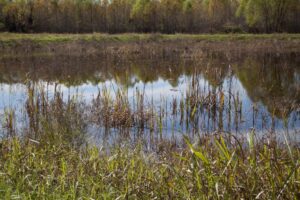The consequences of last year’s U.S. Supreme Court (SCOTUS) decision in Sackett v. EPA are revealing themselves across the nation, as exemplified on both sides of the Wabash River, which runs between Illinois and Indiana. That decision, which redefined “waters of the United States” (WOTUS), stated, “Wetlands that are separate from traditional navigable waters cannot be considered part of those waters, even if they are located nearby.”
“On the Illinois side, lawmakers are scrambling to pass a bill that would protect wetlands from development and pollution, [to] safeguard water quality and limit flooding. But in Indiana, state policymakers hastily passed a law earlier this year to roll back wetlands regulations, at the urging of developers and farm groups who said such rules were overly burdensome,” according to the Kansas Reflector. “That means the water that flows into the Wabash River from the west may soon be governed by very different standards than its watershed on the eastern side.”
According to the Environmental Law Institute, a nonprofit research organization, 24 states relied exclusively on the federal Clean Water Act (CWA) for wetlands protections:
- Alabama
- Alaska
- Arkansas
- Colorado
- Delaware
- Georgia
- Hawaii
- Idaho
- Iowa
- Kansas
- Kentucky
- Louisiana
- Mississippi
- Missouri
- Montana
- Nebraska
- Nevada
- New Mexico
- North Dakota
- Oklahoma
- South Carolina
- South Dakota
- Texas
- Utah
“Nineteen states have state laws protecting many of these waters, while 7 others have laws protecting at least some of the waters losing protection [due to SCOTUS’s] action. However, even some of these states may experience gaps in coverage,” the Institute notes. “For example, some (such as New York) protect only wetlands over a certain size. Others (e.g., Ohio) have adopted laws that protect isolated wetlands but do not protect wetlands that are adjacent to navigable waters but have no ‘continuous surface connection.’
“There will need to be legislative action if protections are to be restored. … Moreover, understanding the scale of the gaps to be filled and organizing a legislative response may well take time. In the meantime, activities such as mining, development, dredge and fill, and even discharges of other pollutants may ramp up (or commence in advance of any legislative responses).”
Illinois Democratic State Representative Anna Moeller said that Illinois has lost 90% of its wetlands since the 1800s, the Reflector adds.
“‘Illinois did not have a fallback plan,’ said state Sen. Laura Ellman, a Democrat who is sponsoring the bill to protect wetlands under state law. We’re cobbling one together right now. The intent is to restore what we had in place before.”
“Ellman and Moeller said bill supporters are working with state regulators to make some minor technical changes before it advances. Paul Botts, executive director of the Wetlands Initiative, a Chicago-based nonprofit, said environmental advocates and regulatory officials have concerns about funding for the program, which lawmakers hope will be largely covered by fees on permit applicants,” the Reflector article continues.
Some blue states, such as Colorado, New Mexico, and Washington, have joined Illinois in drafting state protections or increasing state funding to replace the loss of federal oversight for wetlands, while red states like Missouri, North Carolina, and Tennessee join Indiana in rolling back safeguards, as they’re no longer mandated by the federal government, the Reflector notes.
Although the cost of the permitting program is currently unknown, other states haven’t been successful in funding these types of programs through fees alone, according to the Reflector.
Indiana currently has wetland regulations in place, but lawmakers are moving to change some of the regulations to include wetland classifications with fewer protections.
“You have a ditch that’s backing up water and all of a sudden we’re calling this a wetland,” said Republican State Sen. Rick Niemeyer (Indiana), the bill’s sponsor, in the Reflector. “Our developers were having trouble with the definitions. Agriculture was getting hit with this.
“In Indiana, Illinois and many other states, local homebuilders’ groups have been among the leading voices to curtail wetlands regulation. Rick Wajda, CEO of the Indiana Builders Association, echoed Niemeyer’s assertion that the law will reduce protections only for ‘low-quality wetlands.’”
Historically, developers have said that regulatory rollbacks will lead to more affordable housing, but due to the high price tag associated with building in wetlands, that assertation is false, said Shelli Yoder, Indiana Democratic state senator, according to the Reflector.
The SCOTUS decision has set other states in motion, as well. Colorado is expected to soon introduce a bill to establish state wetland protection, and New Mexico is in the process of introducing a permitting program for wetlands.
“Lawmakers in Washington state also provided a funding boost for agency regulators,” the Reflector continues. “The state’s Department of Ecology already has well-established wetlands standards, but it’s expecting an influx of permit applications for waters that were once covered by federal agencies. With an extra $2 million, agency leaders say they’ll be able to add more staffers to ensure permits are processed on time.”
Other states are joining Indiana in rolling back wetland protections, including North Carolina, Tennessee, and Missouri.
In Missouri, state legislators introduced a bill that the “Missouri Department of Natural Resources warned in a fiscal analysis that the bill could jeopardize the state’s groundwater, which provides drinking water to almost 60% of Missourians, and 136,236 miles of small streams,” says the Missouri Independent.
The bill’s sponsor, Republican State Sen. Rusty Black, “said he introduced the bill because of a U.S. Supreme Court decision that narrowed the scope of the [CWA] and limited the [EPA’s] authority over wetlands. Black’s legislation would similarly limit the types of waters Missouri can regulate,” the Independent article adds.
Many believe Missouri’s current waters of the state definition includes “water bodies” that are more accurately described as ditches instead of streams.

